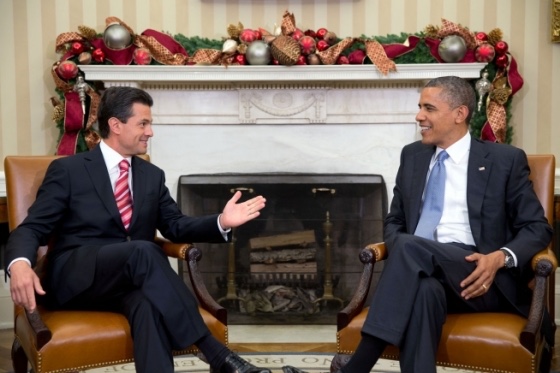Along with a Fresh Start in Cuba, We Need a Fresh Start in Mexico

American leaders have long understood the United States’ southern neighbor to be somewhat of a bastion of stability in an otherwise troubled region. Richard Nixon once told Mexican president Luis Echeverría to “let the voice of Echeverría rather than the voice of Castro be the voice of Latin America.” As Cuba and Nicaragua transitioned from American allies to adversaries and El Salvador and Guatemala descended into a years of horrific bloodletting, Mexico remained a stalwart and (usually) stable Cold War partner.
But Mexico has always maintained a fierce independent streak in its relationship with its northern neighbor (for a good analysis, see Christopher White’s Creating a Third World: Mexico, Cuba, and the United States in the Castro Era). When the rest of the Organization of American States severed ties with revolutionary Cuba in the early 1960s, Mexican leaders assured the defiant Castro that it had a friend in Mexico City. American policymakers had little choice but to stomach this rapport for the sake of regional stability, and Mexico’s governing Institutional Revolutionary Party (PRI) grew emboldened as a result of this “double dealing.”
The unfortunate consequence of this understanding between the U.S. and Mexico, however, has been an inability to address certain issues crucial to the internal stability of Mexico. Since the early 1960s, Mexican authorities have engaged in periodic abuses of human rights, countless instances of election fraud, and deceptive relations with members of drug cartels. The United States basically turned a blind eye to many of these abuses of power, even when the Mexican government was most oppressive. Though Mexico has experienced an impressive amount of economic growth in the past few decades, some of its most pressing security issues have yet to be resolved. And, some of these security matters have contributed to the nonstop flow of migrants and drugs northward, phenomena which the United States usually views as domestic concerns with little connection to the country of origin.
Today, Mexico is in a state of flux. After decades of PRI rule, it “opened” its one-party system to other players in the late 1990s, culminating in just over a decade of governance by the conservative National Action Party (PAN). During PAN president Felipe Calderón’s tenure (2006-2012), the Mexican government decided to wage a bloody war against the country’s ruthless drug traffickers, resulting in thousands of deaths. The ongoing conflict has turned a promising Latin/North American power into an ungovernable basket case. Popular disillusionment with Calderón’s handling of the drug war helped garner support for PRI candidate (and now president) Enrique Peña Nieto, but reports of corruption within Peña Nieto’s administration as well as speculation that his party may have links to the drug cartels themselves have contributed to a profound distrust of authority throughout the country. When the mayor of a town in the state of Guerrero was arrested for ordering the kidnapping and murder of 43 student protesters who were planning to disrupt a political event hosted by his wife, hundreds of thousands of demonstrators hit the streets in multiple cities demanding to know just what happened to the young men.
Mexicans have become accustomed to living with a corrupt government and periodic episodes of violence. But the country has experienced a level of bloodshed in the past few years unseen since the Mexican Revolution of the early 20th century. When Nixon proclaimed that he wanted to see Mexico become a viable alternative to Cuba and a leader in the region, he was referring to Mexico’s willingness to open its borders to foreign investment. Indeed, the Mexican government still appears to be willing to take the necessary steps to ensure competition within its biggest industries. But as the United States pursues a fresh start with former archenemy Cuba, it might want to re-examine its relationship with the country that it has relied on to “ensure regional stability” for so long.
A good first step would be to look inward. One of the more obvious solutions would be to continue to re-evaluate American drug laws, which is absolutely necessary given that Mexico’s criminals earn a majority of their income supplying American users. Any effort to stem the flow of firearms across the Rio Grande would also be a welcome policy, for it is an unfortunate fact that the narcotraffickers commit most of their murders with American guns.
But throughout the past several decades, United States policy towards Mexico has been largely reactive, focusing mainly on rounding up undocumented immigrants and preventing drugs from crossing the border. The U.S. needs to formulate a policy which demonstrates a better understanding of the root problems of Mexico’s insecurity. Such a policy would address issues of income inequality, agricultural subsidies, and some of the more damaging effects of the North American Free Trade Agreement (NAFTA). Many Mexican farmers turn to drug cultivation as legal crops become less lucrative. Would it not be worthwhile to re-examine the trade agreements which have contributed to this problem?
Finally, the United States should put further pressure on the Mexican government to reform its political and judicial institutions. Any country which fails to prosecute or even investigate a majority of its murders will only foster more distrust of its government. Mexico has experienced one major revolution within the past century, as well as several small rebellions since. Mexicans are currently as disillusioned with their leaders as they have ever been, so there is no reason to think that they will silently accept their current conditions. If the United States truly believes that its southern neighbor can be a model for the rest of Latin America, it must establish a more productive relationship which addresses problems of concern to Mexicans themselves, not just Americans.